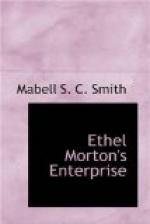“Monster fishes swam
the silent main;
Stately forests
waved their giant branches,
Mountains hurled
their snowy avalanches
Mammoth creatures stalked
across the plain;
Nature revelled
in grand mysteries,
But the little
fern was not of these,
Did not number
with the hills and trees;
Only grew and
waved its wild sweet way,
No one came to
note it day by day.
“Earth, one time, put
on a frolic mood,
Heaved the rocks
and changed the mighty motion
Of the deep, strong
currents of the ocean;
Moved the plain and shook
the haughty wood
Crushed the little
fern in soft, moist clay,—
Covered it and
hid it safe away.
O, the long, long
centuries since that day!
O, the changes!
O, life’s bitter cost,
Since that useless
little fern was lost!
“Useless? Lost?
There came a thoughtful man
Searching Nature’s
secrets, far and deep;
From a fissure
in a rocky steep
He withdrew a stone, o’er
which there ran
Fairy pencilings,
a quaint design,
Veinings, leafage,
fibers clear and fine,
And the fern’s
life lay in every line!
So, I think, God
hides some souls away,
Sweetly to surprise
us, the last day.”
From the Museum the party went to the Bronx where they first took a long walk through the Zoo. How Mary wished that she did not have on a pale blue silk dress and high heeled shoes as she dragged her tired feet over the gravel paths and stood watching Gunda, the elephant, “weaving” back and forth on his chain, and the tigers and leopards keeping up their restless pacing up and down their cages, and the monkeys, chattering hideously and snatching through the bars at any shining object worn by their visitors! It was only because she stepped back nimbly that she did not lose a locket that attracted the attention of an ugly imitation of a human being.
The herds of large animals pleased them all.
“How kind it is of the keepers to give these creatures companions and the same sort of place to live in that they are accustomed to,” commented Ethel Brown.
“Did you know that this is one of the largest herds of buffalo in the United States?” asked Tom, who, with Della, had joined them at the Museum. “Father says that when he was young there used to be plenty of buffalo on the western plains. The horse-car drivers used to wear coats of buffalo skin and every new England farmer had a buffalo robe. It was the cheapest fur in use. Then the railroads went over the plains and there was such a destruction of the big beasts that they were practically exterminated. They are carefully preserved now.”
“The prairie dogs always amuse me,” said Mrs. Smith. “Look at that fellow! Every other one is eating his dinner as fast as he can but this one is digging with his front paws and kicking the earth away with his hind paws with amazing industry.”




